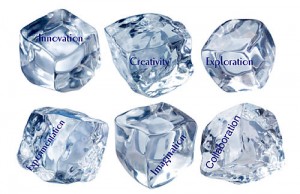Posts tagged ‘authentic mutuality’
OD Theory – Appreciative Inquiry
In addition to the five core OD theories there are other theories that a solid OD practitioners must understand to build on their theoretical foundation for practice. Good grounding in theory is essential for every OD practitioner. The better you understand the theory, the better you will understand the complex and intricate nature of the OD process and OD tool kit.
Appreciative Inquiry in Brief
Appreciative Inquiry rationalises and reinforces the habit of mind that moves through the world in a generative frame, seeking and finding images of the possible rather than scenes of disaster and despair.
Appreciative Inquiry involves a cooperative systematic exploration, discovery and recognition of the best in people and the organisation, affirming past and present strengths, successes, and potential. It is a theory, a mindset, and an approach to analysis that leads to organisational learning and creativity.
At its heart Appreciative Inquiry strengthens a organisation’s capacity to apprehend, anticipate, and heighten positive potential through the use of positive questioning, imagination and innovation. It seeks to deliberately engage the whole of the organisational population, and get them to explore and tapping into rich and inspiring accounts of the positive.
The energy created from this exploration gives momentum to any change agenda and changes never thought possible are suddenly and democratically mobilized. By focusing on the organisations strengths, rather than focusing on problems, the resulting output elicits solutions by fully engaging everyone in the organisation.
Key Points
- Appreciative Inquiry focuses on what the organisation is doing right and provides a frame for creating an imagined future.
- Seeking and finding the generative rather than the destructive image is powerful.
- Human behaviour is shaped by “current reality.”
- There is an impact on human behaviour of “anticipatory reality.” Research suggests that human beings create the future that we imagine.
Applying Appreciative Inquiry in an OD Intervention
- Ensure that the organisation has made a commitment to continuous learning, growth, and generative change.
- Help the organisation find its own way and its own path through an inquiry process that seeks the most creative and generative realities.
- Help individuals and organisations to realise that we can be limited and constrained by our inability to see larger and more expansive realities that are available.
- Provide the environment to help individuals and groups explore beyond what they already know and understand.
- Shape dialogue around ‘what is’ rather than ‘what is not.’
What is Organisational Effectiveness?
teams like buzz words, and every year new phrases are added to management lexicon. The current buzz is around . I remember doing my post graduate diploma and learning that efficiency was doing things right, and effectiveness was doing the right things. So organisational effectiveness is about doing the right things, but what exactly does that mean? Anyone? It appears that Organisational Effectiveness is a difficult concept to pin down.

Francis, Holbeche and Reddington (2012) in their new book offer the following definition;
“Organisation Effectiveness takes as its desired end point sustainable, self-renewing outcomes. This… requires a shift in mindset and practice with respect to organisational change, towards one based on… authentic mutuality.”
That clears that up then.
Well not really. It just adds more buzz words to management lexicon which we will need to unpick to understand.
The first element to highlight is that organisational effectiveness is an end point, which suggests that in order to get there, the organisation needs to have a start point, and has to develop towards the point of achieving the outcome or goal of organisational effectiveness. Its not a process or a system that the organisation adopts, but rather it is something the organisation works towards achieve.
This end point is not something that is static or one thing. Its not like a gold medal that once achieved can’t be unachieved. It is akin to organisational learning in that it is a way of doing things around here, but unlike organisational learning, which you never achieve if you really are learning organisation, but rather is something that can be achieved. If you do the right things, you will continue to do the right things and maintain organisation effectiveness.
The self-renewing and organisational change elements are not new in management literature, but what is different is the element of ‘authentic mutuality’ and that is what makes this definition so exciting. A seemingly banal statement made up of buzz words is actually challenging the way organisations work in regards to the employer/employee relationship. It is ask for organisation to work together with employees in a way that not just benefits the organisation but also the employee. Doing the right thing for the organisation AND doing the right thing for the employees who work in the organisation.
Of course this throws up all sorts of challenges for the organisation in regards to Human Resource practices, and the balancing the tensions created in attempting to do the right things for both organisation and employee. But the output of an organisation focused on doing only the right things for the organisation is being felt in the economic challenges faced by the world today and the broken nature of the western capitalist model which focuses purely on competitive short-term entrepreneurship without consideration of the people in the organisation.
The time is ripe for change, and quite possible with some societal and cultural changes organisational effectiveness is achievable.

